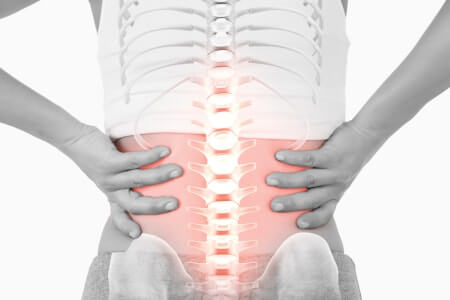When do you need to consult a doctor about a lumbago?
When do you need to contact a doctor immediately when you suffer from a lumbago? The GP is your first port of call. He or she will look at any next steps. In this article you read more about the causes of lower back pain, what you can do and what the doctor may suggest after his/her examination.
Causes of lumbago
There are various structures that impact on the development of lower back pain or lumbago. Intervertebral discs, vertebrae, muscles, nerves and even intestines constitute a complex collaborative unit and may cause back pain when a function is disrupted or in case of illness.
Typical causes of lower back pain are:
- Irritation of the nerves: pressure on one or more nerves due to problems with the intervertebral disc, with radiation (from the pelvis to the lower limbs)
- Tingling nerves due to them being caught between muscles
- Tension of the lower back muscles
- Vertebrae, ligaments or joints that show wear and tear for instance due to too much strain
- Disc degeneration due to too much strain and ageing
- Problems with bowels, abdomen or kidneys
An irritation (infection) or problem with one of the higher structures can therefore cause lower back pain or lumbago. Lower back pain also often radiates to the pelvis and the lower limbs. Sometimes, the pain is located at the level of the vertebrae themselves and sometimes the surrounding muscles are hard. Often muscle spasms can cause back problems after exertion such as gardening (tension of the muscles and too much strain on the intervertebral discs and acute lumbago with sharp, piercing pains).

Lower back pain and lumbago constitute the most common back problems. But the symptoms and severity of the pain differ per patient. For instance, lumbago may be bearable to one person while the other person may experience severe pain. The severity of the complaints is not in line with the development of pain. Simple and harmless muscle tension in the lower back may cause you to have to urgently consult a doctor because of the level of pain you experience, while a hernia or degenerative disc may only cause mild pains.
When do you have to consult your doctor (urgently)?
Often self-care suffices when you have lower back pain. A couple of days rest, a heat pad to the back, a nice hot bath, an infra red lamp, moving (stretching the back, walking, cycling), …
To determine whether you have to visit your doctor with lower back pain you should initially follow your gut instinct and assess the pain yourself.
Just check whether you have done something in the last 2 weeks that you normally would not do. Have you lifted a heavy object? Have you made repetitive movements you normally do not make? Have you experienced a period of stress? Have you been very tired recently (and you know the cause)? It is understandable that your body is slightly out of sorts and this can express itself in back pain.

If the problems are not severe, you can normally compare them to the problems you had in the past. So you can asses whether they will pass or not. If the complaints continue for more than 3 to 5 days, without the pain reducing, it is advisable to consult a doctor.
However, when a sudden movement causes severe pain and you feel a change in feeling at limb level and if you experience loss of muscle strength, you must consult your doctor immediately.
It is advisable to consult a doctor:
- When you have a fever or feel ill and nauseous
- Unexplained weight loss
- Loss of strength in the legs
- Incontinence and poor control of bladder and bowel movements
- Constant pain which radiates to the abdomen
- Complaints that persist more than 5 days
- Pains that increase after 3 days
They can all indicate a serious injury or an infection, a fracture or even a problem with the organs.
Diagnosis and treatment of lumbago
It is always necessary to be diagnosed by a doctor or specialist who will then refer you to a physiotherapist, manual therapist or osteopath.
On the basis of the diagnosis, the therapist will draw up a tailor-made treatment plan and ensure that the pain reduces or is eliminated. The best results are from a combination of various treatment methods. Without a visit to the doctor you will not be reimbursed by your insurance.

The first aim is always to prevent back pain from occurring. You do this by minding your posture and by aiming for a healthy lifestyle. Make sure that your body is in a good condition and prevent overweight. The body must be in balance. A good night’s sleep is essential for this.
When back pain occurs anyway, the following steps can be recommended:
- Diagnosis by a doctor
- Treatment by a therapist (in combination with medication or not)
- Relative and absolute rest
- If the above does not help, possible surgery


